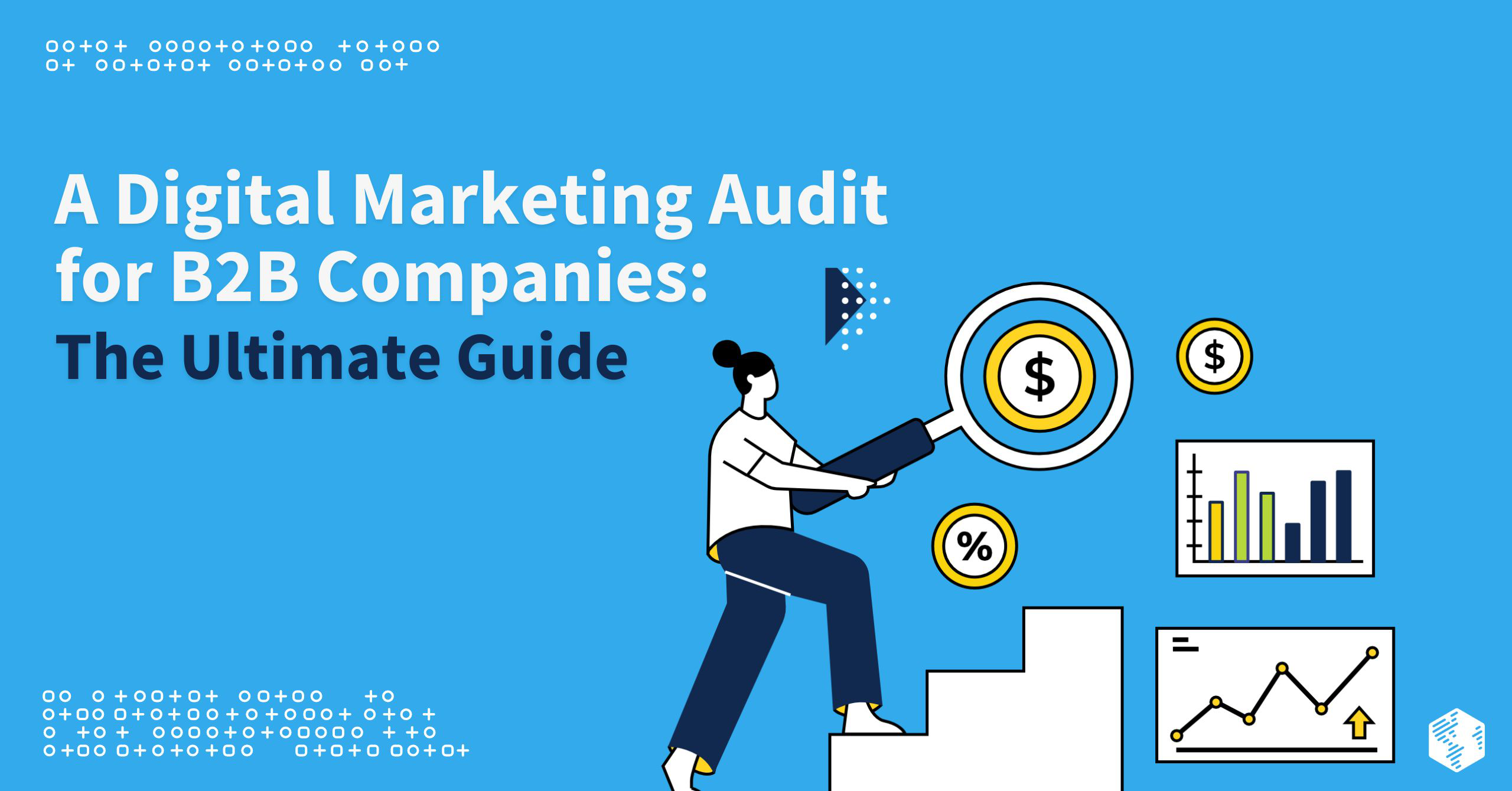Table Of Contents
Is your digital marketing strategy working effectively to reach target audiences, generate new leads, and establish your brand identity?
The online presence of your business-to-business (B2B) company is a critically important part of its success. To stand out from the competition and increase revenue, organizations must establish and maintain a digital presence—and businesses without a strong digital marketing strategy will find it more and more difficult to survive.
How do you assess your B2B company’s digital marketing capabilities and determine how to optimize your online presence? By conducting a digital marketing audit.
What Is a Digital Marketing Audit?
A digital marketing audit is an in-depth analysis of your B2B company’s digital marketing initiatives. The audit includes an assessment of your website, marketing channels, strategy, brand image, and more to determine what results you are driving and the outcomes you are producing.
Ideally, a digital marketing audit will answer a variety of questions, including the following:
- What are the strengths and weaknesses of your digital marketing strategy?
- What digital marketing campaigns have been the most successful?
- Which digital marketing channels provide above-average returns?
- Are there any opportunities for growth?
- Which key performance indicators (KPIs) are regularly met?
- Where would additional funds have the greatest impact?
- What marketing investments and strategies should you consider for the upcoming quarter, year, and more?
By reviewing your online marketing campaigns and digital marketing strategy, the audit can help you find weak spots and figure out how to improve them. Additionally, the results of a digital marketing audit can serve as a standard for evaluating marketing activity in the future.
Why Your B2B Company Should Conduct a Digital Marketing Audit
There are many benefits of conducting a digital marketing audit:
- Identify weak points and obstacles in your current marketing system
- Find new opportunities for growth
- Keep marketing efforts on track with overall company revenue goals
- Boost the morale of your marketing team
- Increase the return on investment (ROI) of your marketing efforts over time
With the results of a digital marketing audit, your B2B company can make data-driven decisions about how to best optimize your digital marketing efforts. However, if you don’t invest in a digital marketing audit, you are making it more difficult to meet marketing goals and KPIs.
What to Analyze During a Digital Marketing Audit
Digital marketing is multi-faceted, and all of those facets should be examined and evaluated as part of a digital marketing audit. As part of the digital marketing audit process, you will consider a variety of segments and complete an audit on each part. Then, by compiling the results, you can pinpoint how to best optimize each facet of your overall digital marketing strategy.
Here are some of the most important parts of a digital marketing campaign as well as what to look for when conducting an audit of each segment.

Reporting
What reporting processes do you have in place? What KPIs do you want to measure?
If you don’t have a way of tracking marketing performance, you won’t know where to go next. Evaluating digital marketing data requires a clear, informative, centralized reporting process.
Objectives
Digital marketing objectives and KPIs should be clearly defined and periodically evaluated. If your marketing objectives haven’t been updated in a while, then they no longer reflect the current B2B marketing landscape. Start with the big picture and work your way down to detailed action items.
Strategy
You need to have an existing digital marketing strategy in order for your various marketing efforts to succeed. Make sure you have a comprehensive digital marketing strategy in place that meets your objectives, budget requirements, resource allotment, and time frames. By analyzing your marketing strategy, you can identify gaps and decide how you can fill them with new marketing initiatives.
Technology
Are you using slow, outdated applications or inadequate tools? Your competition certainly isn’t.
To stay cutting edge, your B2B company needs to use software applications and tools that help to optimize your business processes. Start by assessing all your marketing technology, from your website and customer relationship management (CRM) software to your automation tools and reporting software.
Brand Identity and Consistency
Your brand identity needs to be consistent across your marketing channels. A digital marketing audit can help you understand if people get a strong sense of your brand identity. With this information, you’ll be able to see what you’re doing right and wrong when it comes to establishing your brand in the eyes of your target audience.
Marketing Channels
Every digital marketing channel your B2B company has invested in should be considered as part of your digital marketing audit. Some of the most popular marketing channels included in audits are content, email, social media, search engine optimization (SEO), website design, and pay-per-click (PPC) advertisements.
Content
Content includes a variety of components on your website—blogs, landing pages, copy, ebooks, white papers, and any other written content. Evaluate each component of your content marketing strategy and ensure you have a strong strategy in place for planning out content, maintaining a content calendar, publishing content pieces, and sharing content across other marketing channels.
A digital marketing audit will help you identify areas of your content marketing strategy that lead to low engagement or low conversion rates.
READ: How to Prepare Your Business for Next Year: Top B2B Digital Marketing Trends to Expect in 2023
Email marketing is a versatile digital strategy with a high ROI, so it’s important to optimize this marketing channel. Examine the quality of your database of contacts, rate the performance of previous email campaigns, and collect metrics such as open and click rates.
Social Media
Assess the effectiveness of your social media initiatives among the various platforms you engage with. Has your brand recognition increased? Do you regularly engage with followers? What is your click-through rate (CTR) and the number of impressions for your average post? An audit will help you determine if your social media campaigns are aligned with your marketing goals and objectives as well as provide a guide for improving your performance on social media.
SEO
The goal of SEO is, ultimately, to drive organic search engine traffic to your website. By using SEO tools like Google Analytics, you can view your website traffic, see how visible your website is on Google and other search engines, and figure out how to optimize your website.
For example, you may need to fix technological issues (broken links, missing alt tags, etc.), improve on-page SEO (keywords, meta data) or ensure your website is mobile-friendly. All these aspects impact the success of your overall digital marketing efforts.
PPC
Evaluating the success of PPC campaigns is an essential part of a digital marketing audit. Consider both the CTR and conversion rate of your PPC ads to see whether they are driving clicks and conversions. Otherwise, your company may not be able to tell if they are getting a ROI when it comes to ad spending.
A digital marketing audit will help you determine how current PPC campaigns are performing and what steps you should take to improve their performance.
How to Conduct a Digital Marketing Audit: 4 Steps to Follow
Conducting a digital marketing audit is a long, meticulous process that can take anywhere from weeks to months to complete, depending on the unique qualities of your B2B organization. Fortunately, most digital marketing audits use a similar approach. Follow these four steps as you conduct your B2B digital marketing audit.

1. Define Key Goals and Metrics
If you try to measure every single data point, you’ll drown in numbers. Instead, the first step of conducting a digital marketing audit is to determine what goals you want to accomplish with the audit as well as which metrics are relevant to those goals.
For example, you may choose to determine the top three metrics for each marketing channel. You might also establish goals per channel or create time-based goals per quarter or year.
2. Gather Data from Digital Marketing Channels and Analyze Performance
Each digital marketing channel has its own method of data collection. For every relevant digital marketing channel, collect data and compare the results to your established goals and metrics. Which channels are exceeding expectations, and which ones are falling short? How can you optimize your digital marketing strategy for each channel?
3. Evaluate the Competition and Landscape
Conduct research on your competitors—B2B organizations targeting the same audience as your company. Consider the tactics and tools they are using successfully as well as the gaps they aren’t filling that you could exploit.
Additionally, assess the larger competitive landscape. Legal shifts in the industry as well as cultural considerations can have a significant impact on your digital marketing efforts, so you need to be aware of them.
4. Examine Brand Messaging and Positioning
In B2B marketing, your brand is everything—and your digital marketing audit needs to examine your brand identity.
Brand messaging concerns how you communicate value to buyers, and brand positioning involves the impression of your brand in the minds of potential customers. These two aspects of branding should be a significant part of your digital marketing analysis.
Hiring a Digital Marketing Audit Company vs. Doing It Yourself
To get the most out of a digital marketing audit for your B2B company, it needs to be thorough, well-researched and data-driven. Your digital marketing audit should consider what your marketing efforts have achieved over time, evaluate all aspects of your current and previous marketing campaigns, and suggest action items that align with key company marketing goals.
This process takes a significant amount of time and effort, and conducting a digital marketing audit in-house can be a time-consuming challenge.
While one option is to assign members of your marketing team or revenue operations staff to this project and allocate the resources necessary to conduct a full audit, another efficient choice is to hire a digital marketing audit company to handle this work for you.
Whether you decide to hire a digital marketing audit company or do the work yourself, you can begin the process by downloading a digital marketing audit template from a trustworthy source and determining which option is right for your B2B company.
Get Your Free Digital Marketing Audit at OneIMS
At OneIMS, our team of digital marketing experts is ready to help your organization evaluate and optimize your marketing strategy. We have the strategies, solutions, and tools you need to identify new opportunities for improvement and launch a new digital marketing framework that will transform your B2B brand into a revenue-generating machine.
We have a long history of working with companies in a variety of industries to develop innovative and data-driven marketing solutions, and we pride ourselves on producing measurable and sustainable results.
But you don’t have to take our word for it. View testimonials from our clients, read our blog to get an idea of our training, experience, and track record of success and schedule a consultation with us today to get started.






